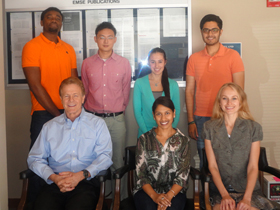An EEM team successfully completed a research project sponsored by the Potomac Electric Power Company (Pepco) during the Summer and Fall 2013. The project, funded by Pepco at $50,000, developed a smart meter consumer education curriculum and research project, complete with survey instruments, and undertook a series of pilot tests of the educational program. The driving force behind the project was to help Pepco implement its state-of-the-art smart metering program and the District of Columbia.

Pepco, the electric utility serving Washington, D.C., began installing smart meters at all customer locations about three years ago. The purpose of Pepco’s smart metering project is to help energy consumers better manage their energy use by providing real-time electricity consumption information that can help them reduce their energy bills. In addition, the project is expected to reduce the need for the construction of additional electricity generating plants by shifting time-of-day energy consumption to times when excess power generation capacity already exists, thereby reducing carbon emissions. However, Pepco has found that most customers aren’t taking advantage of these new capabilities because they don't know how to use the new smart meters and decided to partner with GW to address that problem.
EMSE Prof. Jonathan Deason; Visiting Scholar Joe Cascio; Assistant Professor Ekundayo Shittu; graduate students Priya Swamy, Ira Payosova, Junchao Gu, Soala Whyte and Benjamin Heras; and recent EEM graduate Vanessa Trejos developed the smart energy consumer education curriculum and consumer research program on smart meter usage. In addition, the EEM team developed a series of additional ancillary components, including a PowerPoint slide deck, instructors note, audience interaction techniques course handouts, a program brochure, end-of-course and follow-up survey instruments, and an online education course development plan. To see a copy of the program brochure, click here: EEM/Pepco Smart Meter Consumer Education program brochure.
In light of the hugely important challenge the world is facing from global climate change, the work of this graduate student-faculty team well illustrates the direct impact that graduate students in the EMSE Environmental and Energy Management concentration are having on the sustainability of our planet while pursuing their educational goals.
A smart meter is an electrical meter that records consumption of electric energy in intervals of an hour or less and communicates that information at least daily back to the utility for monitoring and billing purposes. Smart meters enable two-way communication between the meter and the central system. Unlike home energy monitors, smart meters can gather data for remote reporting. Such an advanced metering infrastructure (AMI) differs from traditional automatic meter reading (AMR) in that it enables two-way communications with the meter.
Similar meters, usually referred to as interval or time-of-use meters, have existed for years, but "Smart Meters" usually involve real-time or near real-time sensors, power outage notification, and power quality monitoring.
Since the inception of electricity deregulation and market-driven pricing throughout the world, utilities have been looking for a means to match consumption with generation. Traditional electrical and gas meters only measure total consumption, and so provide no information of when the energy was consumed at each metered site (market use rates are readily available to utilities however). Smart meters provide a way of measuring this site-specific information, allowing price setting agencies to introduce different prices for consumption based on the time of day and the season. Smart meters may include measurements of surge voltages and harmonic distortion, allowing diagnosis of power quality problems.
Utility companies point out that smart metering offers potential benefits to householders. These include, a) an end to estimated bills, which are a major source of complaints for many customers b) a tool to help consumers better manage their energy use - stating that smart meters with a display outside their homes could provide up-to-date information on gas and electricity consumption and in doing so help people to manage their energy use and reduce their energy bills and carbon emissions. Electricity pricing usually peaks at certain predictable times of the day and the season. In particular, if generation is constrained, prices can rise if power from other jurisdictions or more costly generation is brought online.

Proponents assert that billing customers by time-of-day will encourage consumers to adjust their consumption habits to be more responsive to market prices and assert further, that regulatory and market design agencies hope these "price signals" could delay the construction of additional generation or at least the purchase of energy from higher priced sources, thereby controlling the steady and rapid increase of electricity price.
At the conclusion of the research project on November 30, 2013, the EEM team began working with Pepco representatives to plan for a follow-on phase involving full-blown implementation of the consumer education program in the development of an online version. It looks like this new partnership with Pepco will be providing research and educational opportunities for EEM graduate students for the foreseeable future.


